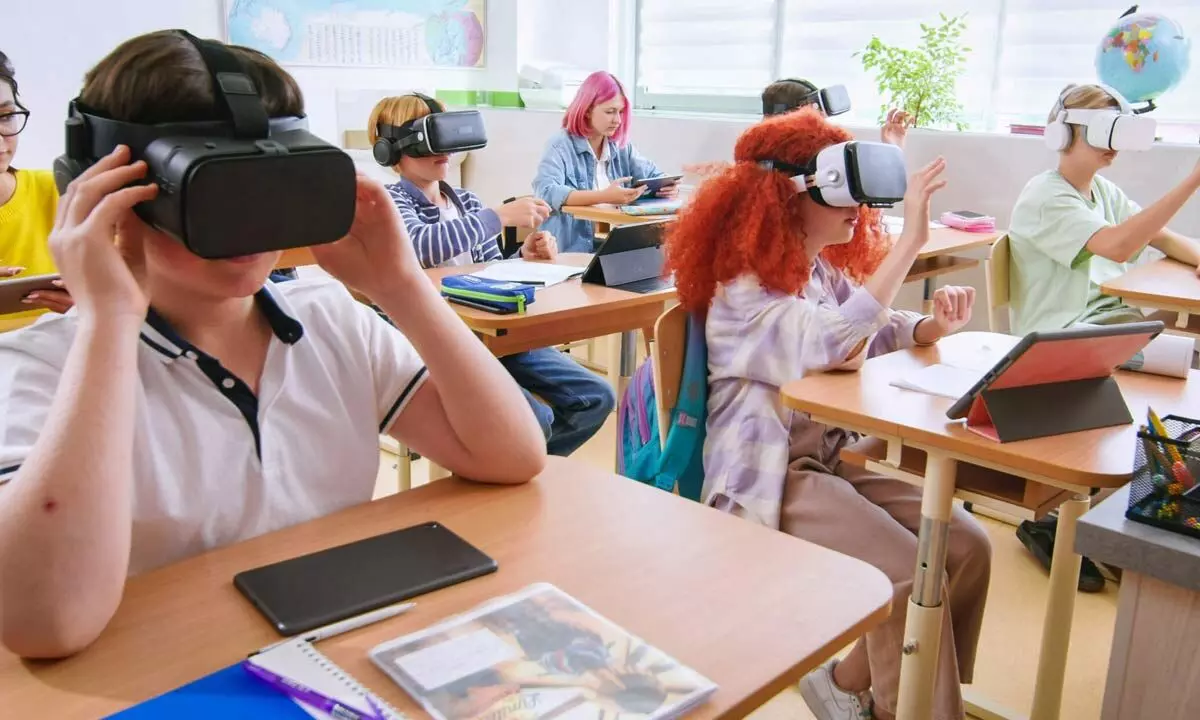Balancing technology and education

Young children are growing up surrounded by screens, from computers and televisions to smartphones and tablets, in this increasingly digital world
Young children are growing up surrounded by screens, from computers and televisions to smartphones and tablets, in this increasingly digital world. Parents, educators, and researchers are all concerned about the use of technology in early life. Preschoolers need to balance screen time with other learning activities and play to grow normally. This article highlights the idea of ensuring that technology can be a helpful teaching tool while offering guidance on managing the difficulties associated with screen time for young children.
“According to The American Academy of Pediatrics (AAP), high-quality programming screen time of 1 hour per day for preschoolers aged 2 to 5 years helps in enriching their brain with problem-solving and analytical skills.”
Understanding the limitations
For preschoolers, screen time can become a double-edged sword. Technology can provide engaging and instructive information to improve learning and growth. However, on the other hand, too much screen time can be harmful and result in several concerns, such as a possible disconnection from reality, physical health problems, and delayed social and emotional development. Achieving a balance between providing young brains with the advantages of technology and traditional play and learning activities is essential for their overall development.
Nevertheless, it's critical to prioritize content quality above quantity. Not all screen time is equal, nor does it always have educational benefits. Parents, guardians, and teachers need to limit the media that their kids are exposed to at such a young age.
Selecting educational content
Screen time is not always bad. For preschoolers, high-quality educational content can be a useful resource. Children may learn letters, numbers, shapes, and other fundamental skills with the aid of ample options of applications, games, and websites. Online learning is entertaining and interesting due to the abundance of interactive ebooks and educational videos. Age-appropriate educational materials that correspond to the child's developmental stage should be researched and chosen by parents or teachers.
Establishing limits
It's crucial to establish screen time limitations. Parents should set up clear guidelines and rules for when and how to use screens. These boundaries have to be upheld consistently. Preschoolers benefit from regularity and discipline, and establishing limits on screen time might help them realize that using technology is a luxury that should only be used cautiously.
Working together to use technology
Active participation is another crucial component of appropriate screen time. The child's internet activities should involve parents and guardians. Parent-child dialogue and reinforcement of screen-time learning can only be achieved through co-viewing and co-playing together, improving the educational experience and fostering social contact.
Managing offline activities in balance
Children should participate in a range of offline activities in addition to screen time. Preschoolers learn and grow through active play, social engagement, and practical experiences. A well-rounded early learning requires promoting play with conventional toys, outdoor pursuits, and literature. The Ministry of Education in India survey says “When kids have to figure out how to move around each other or what to do when they meet in the center of the beam, it helps them solve problems. Additionally, balancing offline activities in preschoolers builds muscular endurance and strength, especially in the core as physical fitness is as important in today's world as emotional awareness.”
Monitoring and supervising
Parents must keep an eye on their kids' screen time and know what they're doing online. To assist in restricting access to unsuitable content, there are parental control applications and settings available. It is crucial to talk to your child regularly about their internet experiences and to answer any concerns or inquiries they might have.
To conclude, Screen time is an essential component of a preschooler's life in the modern digital world. But you must approach it with equilibrium and attention. When handled sensibly and moderately, technology can be a useful teaching tool. To help preschoolers discover the correct balance between technology and conventional forms of education and play, parents and caregivers can choose educational content, set restrictions, engage with their children, and encourage offline activities. By doing this, we can make sure that a child's early years with screens can stay healthy and enriching.
(The author is CEO and Founder of Makoons Group of Schools)

















